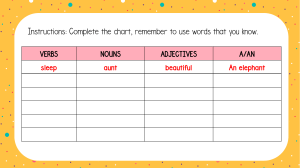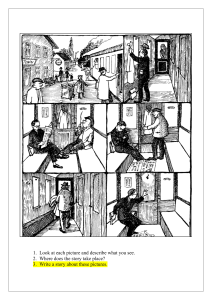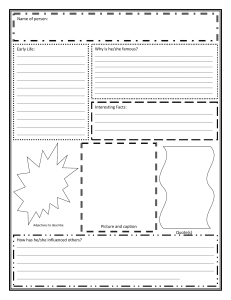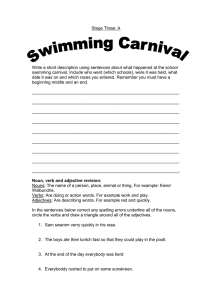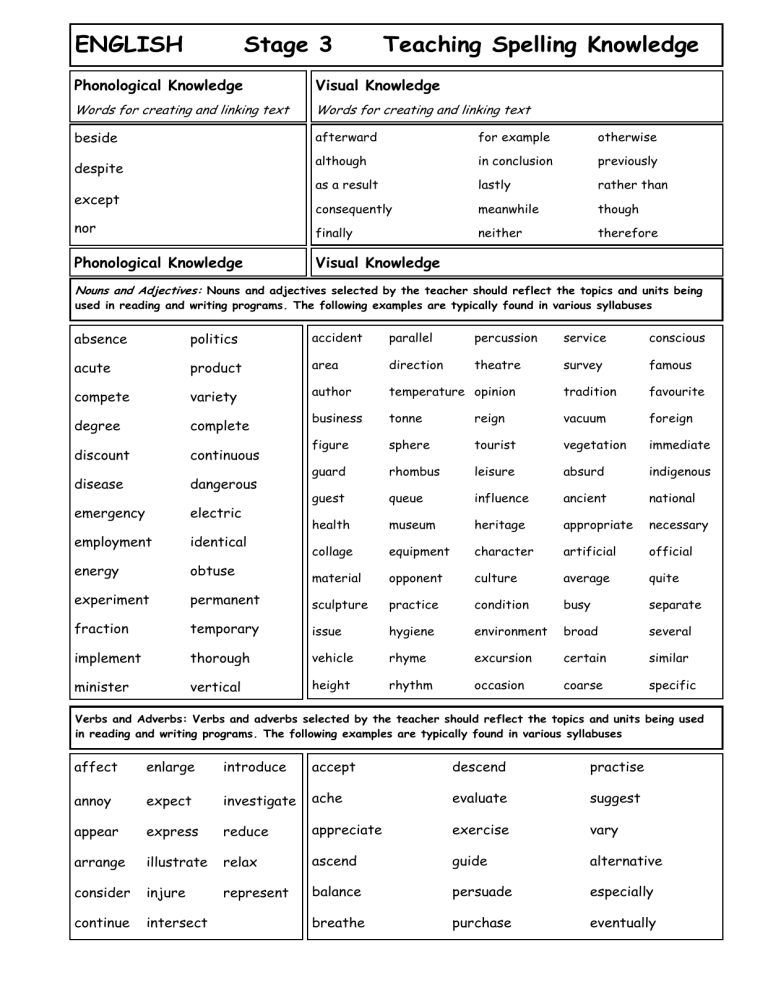
ENGLISH Stage 3 Teaching Spelling Knowledge Phonological Knowledge Visual Knowledge Words for creating and linking text Words for creating and linking text beside afterward for example otherwise although in conclusion previously as a result lastly rather than consequently meanwhile though nor finally neither therefore Phonological Knowledge Visual Knowledge despite except Nouns and Adjectives: Nouns and adjectives selected by the teacher should reflect the topics and units being used in reading and writing programs. The following examples are typically found in various syllabuses absence politics accident parallel percussion service conscious acute product area direction theatre survey famous compete variety author temperature opinion tradition favourite degree complete business tonne reign vacuum foreign discount continuous figure sphere tourist vegetation immediate disease dangerous guard rhombus leisure absurd indigenous emergency electric guest queue influence ancient national employment identical health museum heritage appropriate necessary collage equipment character artificial official energy obtuse material opponent culture average quite experiment permanent sculpture practice condition busy separate fraction temporary issue hygiene environment broad several implement thorough vehicle rhyme excursion certain similar minister vertical height rhythm occasion coarse specific Verbs and Adverbs: Verbs and adverbs selected by the teacher should reflect the topics and units being used in reading and writing programs. The following examples are typically found in various syllabuses affect enlarge introduce accept descend practise annoy expect investigate ache evaluate suggest appear express reduce appreciate exercise vary arrange illustrate relax ascend guide alternative consider injure represent balance persuade especially continue intersect breathe purchase eventually ENGLISH Stage 3 Teaching Spelling Knowledge Morphemic Knowledge Etymological Knowledge Examples of words which could be used Words for creating and linking text apology apologetic apologise exhaust exhausted exhausting inexhaustible audience audible audio auditory minimum minimal belief beliefs believe believer believable unbelievable fright frighten frightened frightening medical medicine medication thermometer thermal thermostat curious curiosity miser miserly cent centimetre centipede centilitre centenary Centigrade diagonal diameter physical physician envy envious enviable unenviable sign signify significant insignificant citizen city civil civilian pedestrian pedal pedestal population popular popularity economy economic economical situation site situated society social sociable Forming compound words eg downstairs, newspaper, overbearing equal equilateral equivalent symmetry sympathy symphony Common prefixes and suffixes for adjectives: -able: comfortable -eous: righteous -ible: convertible -less: helpless -ful: thoughtful in-: inaudible -y: happy un-: unable -ous: famous dis-: disappointed judge judgement adjudicator judicial maximum maximise technique technical technology Adverbs formed by changing -y to -ily on adjectives eg happy , happily million millilitre geography geology geometry geographic Examples of verbs which could be used accommodate accompany advertise announce appreciate approve alternate calculate celebrate classify commit communicate compete confide contribute decide demonstrate determine disappoint elect examine interrupt identify investigate manage negotiate occur organise prepare pollute recognise recommend close involve revolve evolve compel repel expel dispel propel emit transmit submit missile emission aspire conspire respire perspire describe inscribe proscribe transcribe avert convert revert divert revive survive exclude include inclusion ENGLISH Stage 3 Teaching Spelling Knowledge Concept Groupings These are words which could be taught using any of the four forms of knowledge but they would usually be presented together. At this stage they would be modeled for students and then used by students from sources around the room. Many students should then be able to spell these words independently in their writing. Teachers and students can form lists of concept groups using topics in any key learning areas. Australian states, territories and capitals, eg Victoria, Melbourne, Tasmania, Hobart, Canberra Civic concepts, eg government, premier, minister, federal, parliament, senate Words describing personal qualities, eg delightful, considerate, famous, helpful, affectionate, peculiar, miserable Natural phenomena, eg barometer, predict, earthquake, volcano, cyclone, disaster Astronomy, eg planets, asteroid, Mercury, Neptune, vacuum Physical land features, eg desert, coastal, valley, erosion, climate Animals, eg vertebrate, invertebrate, species, mammal, insect, reptile How these words might be used to develop spelling knowledge Spelling Knowledge Concept Phonological Civics terms minister premier Astronomy planet asteroid Abstract nouns Visual Morphemic govern governed government federal federation Etymological parliament vacuum Mercury mercurial fame famous infamy infamous misery miserable miserably affect affection affective affection affectionately Mars Martian martial
